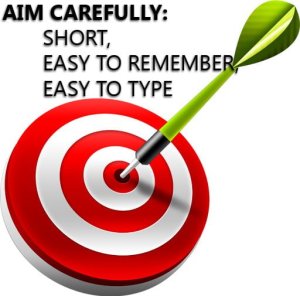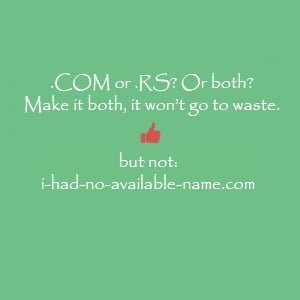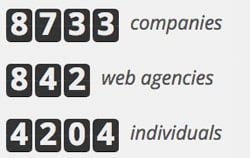If a shop window is no good, no one will even take a peek into the store – this old truism’s paraphrase can quite certainly be applied to your website’s domain. Do not trust the faulty claims that domain name does not matter. Although not the sole nor the most decisive factor in your business development (whether it’s an offline or an online job, a big company or a personal blog), the domain name is a reader’s, client’s, buyer’s first contact with your website or brand. So it’s really important that you make it good. The best it can be.
No matter the method of choosing the domain, what matter is that it is catchy, memorable, to associate people to what you do and to be easily readable. Ideally, you should be choosing a domain name while your plans and ideas for a job, blog or a start-up project are still digesting, so that you could plan complete branding ahead and to make a chosen domain name coordinated with the rest of the branding (because today the chances to find a free domain for a word you need are getting slimmer).
Act Fast and Claim Domain Name and Social Pages
When you are choosing a domain, it would be advisable to ponder the accompanying social network accounts – a few years back I made a typical rookie mistake: I registered a domain maminsvet.net (mamma’s world), made a website and only then realized that a big diaper manufacturer already has an identically named FB page! They came first, claimed the name and there was nothing I could do.
A well chosen domain can help your brand develop. If we were to roughly split your options, a domain can be your name, your company’s name, a name of a product or a project or a name bound to a niche that you’re involved with.

Whatever method you decide upon, these advice will help you pick a great website domain wisely:
- Make it easy to remember. A short, memorable name will help people remember, adopt and tell others about the existence of a website. In many research this is cited as a very important part of direct website traffic – when people type in the name of a website directly, instead of coming by it via social networks or search engines.
- Make it easy to type. The owners of a Fiverr domain got fed up with people typing the website’s name erroneously so the purchased a Fiver domain, too. 🙂
- Make the domain name short. Or as short as it can be. Although a required minimum is three letters (sometimes two), those acquainted to the subject say it’s best for domain to be somewhere between 5 and 15 letters in length. If what you picked does not fit within those frames or a domain is not available, then shape it up as you can, while trying to “spend” as few letters as possible. But bear in mind that a sufficiently short name is sometimes a better argument than a brand or a good keyword.
- Avoid similarities to competition. It does not matter whether your competitors are stronger than you or not, it’s not good to be mistaken for something that you’re not. On the other hand, people “nick” some great domains before others do, taking control of an entire niche, for instance baker.rs, health.rs and so on.
- Avoid dashes. If the name you planned on taking is unavailable, some people will turn to dashes, so instead of tshirts.rs they will pick t-shirts.rs Make a play on words, for it might be a better idea to purchase domains like buyatshirt.rs, takeashirt.rs, shirtsforall.rs than a domain with a dash.
- Avoid branded names. It’s like putting your hand in somebody else’s honey pot. For instance, blogger Milos Petrovic had troubles for FacebookSrbija.rs domain and had to rename it in order not to intrude the Facebook’s brand name.
- Keywords are important, but not decisive. While it surely is fine for a domain name to contain a keyword, it is not always doable. Many experts, as an alternative to SEO, suggest HEO (human eye optimization). Domains are for people, not machines, so try to make a domain name memorable, easy to type and short, with no “hard” marks. If you manage to squeeze in a key word – good! If not, no harm done.
- Use tools for keyword search. A large number of free tools for checking the quality of keywords when choosing domains can be found on internet and I advise you to give few a try: most will find different keyword combinations suitable to you that are related to your domain. There are even those that will come up with lovely, melodious names that you can build your brand upon.
“Experts that work with hosting and domains are advising the so called radio domain check before the final purchase – the domain name has an all clear if chances to type it wrongly after hearing about it on a radio are small.”
Which Extension to Pick?
For a good domain it is not irrelevant which extension it has at the very end of its name. Sometimes it is just the extension that makes all the difference between “regular” 10 bucks worth of domain and those “solid gold” ones, worth tens of thousands of dollars. Top Level Domains (TDL) are surely the wisest choice, but it is getting increasingly hard to find an available domain (you can forget about one word/short ones).
Globally, .com is undisputed, and even though they are not recommended for projects not meant for global market, plenty of websites from our language region has a registered .com domain. With it, no matter that you do, .rs domain is essential. Beside .rs, you can opt for less attractive .in.rs (for personal use) and .co.rs (legal domain), while for educational purposes there is the .edu.rs.
It is also very interesting to use a marketing potential of domain extensions some other countries have, like Montenegro (me) or Sweden (se) because they make for a fantastic play on words on Serbian language (the Montenegrin extension also works in English) – povedi.me (take.me), procitaj.me (read.me), digitalizuj.me (digitalize.me) are just some examples on how certain extensions can be put to a great use completely in spirit of a language. Sometimes a great domain name can compensate for extension and brand itself very nicely. For instance, a domain name putovanja.info (travel.info).
 Secure Yourself
Secure Yourself
- Buy several most frequent (and for your business most important) domains. When you are buying a domain, it is desirable to secure yourself by buying other most common domain extensions – for instance, if you are buying a .com, also go for .net or/and .rs. We already spoke of how to park your domain in cPanel. This is compulsory for great brands and companies, institutions and the likes, in order to prevent somebody else take the domain and cause you problems. A famous blogger Tanja Vehovac had experienced something of that kind on her own blog mooshema.com that conflicted with oilcloth manufacturer. Their conflict also revolved around the rights to use the name of a FB page.
- Be wary of a word play. If assembled from a couple of words, domain name can go sounding terribly wrong and make unpleasant associations on something else entirely. The domain owners of www.whorepresents.com, www.expertsexchange.com, www.penisland.com www.powergenitalia.com surely did not have in mind the phrases that can be read in domain names.
- Purchase a domain for more than one year. If you are venturing into any remotely serious business, you will surely need a domain in the years to come. Purchasing a domain for many years may cost you a bit dearly now, but in the long run it will turn out cheaper plus you’ll avoid the unfortunate avent of forgetting to renew the domain. We saw examples of many big companies come offline for a period of time because they actually forgot to renew their domain. It happened to such giants as Hotmail a few years ago and more recently to AirSerbia.
- Personal domain branding is not always a way to go. If you are Coca Cola, Pampers or Honda, then the brand domain is a sensible thing to do. But what if you are making a personal blog? A lot of people who are in some way linked to internet with their business, take namesurname.com or name.com domains, or even nickname.com. Although this type of domain does influence recognizability and branding the blog/website/product, sometimes it can turn out to be a dead end. Chris Brogan has once expressed regret for not naming his website differently, even “incredible monkey”, because that way he’d have a very good chance of selling it favourably. As it is, who needs a website with a personal name? The fact that your website can grow into something very large and important while named personally and branded that way, minimizes the probability that one day you may sell it.


 Secure Yourself
Secure Yourself





0 Comments